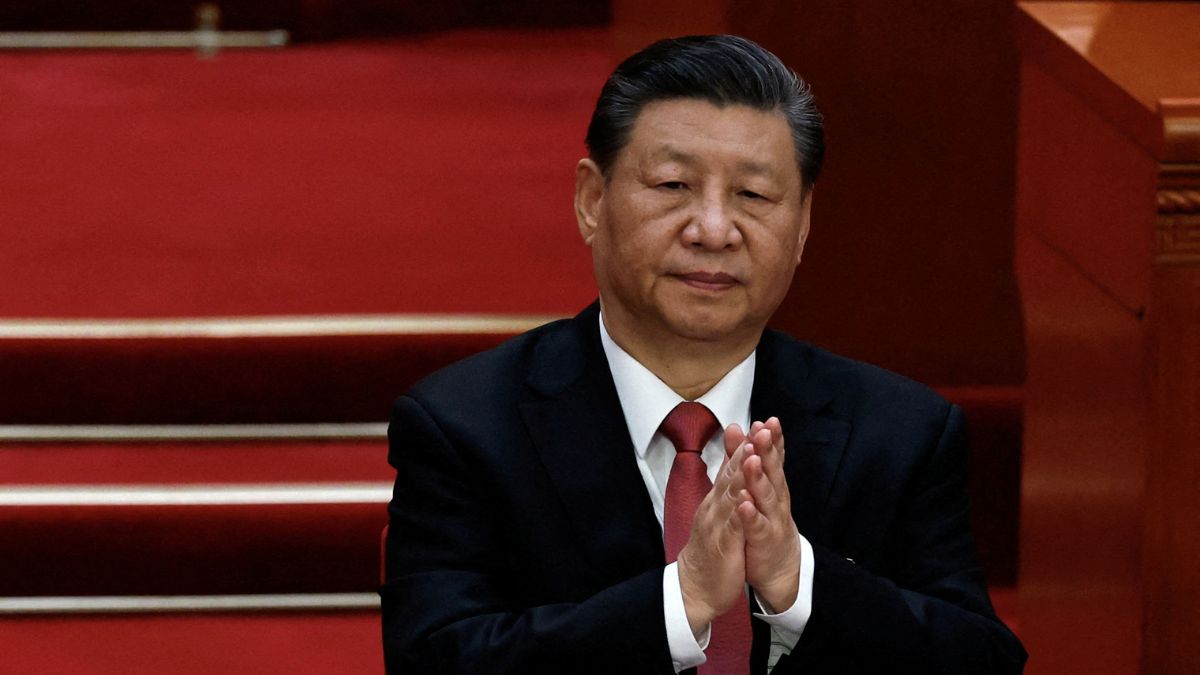Despite an upgraded economic forecast from the IMF, China’s Third Plenum prompts scrutiny over its priorities: bolstering Xi Jinping’s leadership image or addressing the nation’s economic downturn? read more
)
(File) Chinese President Xi Jinping. Reuters
Despite the International Monetary Fund revising China’s 2024 economic growth forecast up to 5 percent in its latest World Economic Outlook update from the 4.6 percent predicted in April, the same enthusiasm is lacking on the ground as growth is slowing and becoming more unbalanced.
Xinhua news agency reported that the International Monetary Fund (IMF) revision on Tuesday is mainly due to a rebound in private consumption and strong exports in the first quarter.
According to the statement, resurgent domestic consumption in China drove the positive growth in the first quarter, assisted by what appeared to be a temporary increase in exports that belatedly reconnected with last year’s rise in global demand.
No enthusiasm on ground
The Wall Street Journal in a piece said that China faces multiple economic challenges as consumers are curbing their spending, the housing market remains depressed, local governments are heavily in debt and foreign investors are withdrawing their funds. This comes at a time when the country is dealing with a rapidly ageing population. Economists believe that an increased focus on manufacturing is unlikely to resolve these issues and may even worsen relations with the US and other countries.
It is unlikely that in the ongoing plenum which endorse Xi’s vision will pay heed to Western calls for more balanced growth driven by increased Chinese consumption. Economists warn that failing to boost domestic spending on global goods and services could lead to more trade disputes.
Real estate woes continue
Moreover, China’s real estate crisis, now in its third year, began when Beijing imposed stricter regulations on developers to control excessive borrowing. Previously, the property sector and related industries contributed up to a quarter of China’s annual economic output, but they are now a significant drag on the economy, with property investment declining by 10.1 per cent in the first half of 2024.
Property has long been a crucial driver of growth, propelling China to its status as the world’s second-largest economy. However, in 2020, regulatory measures aimed at curbing excessive borrowing and speculation tightened access to credit. Since then, the sector’s leading firms have been burdened with mounting debt and stalled construction projects.
According to AFP, ratings agency Fitch recently projected a 15-20 percent decline in the value of new home sales this year, highlighting a “dampening trend in homebuyer sentiment.”
Depressing numbers
China’s economy experienced a 4.7 per cent year-on-year growth in the second quarter of 2024, according to official data released on Monday. This growth rate fell short of the 5.1 per cent forecasted by analysts polled by Bloomberg.
In detail, the National Bureau of Statistics (NBS) reported that the GDP increased by 5.3 per cent year-on-year in the first quarter, followed by a 4.7 per cent rise in the second quarter.
Retail sales, a significant indicator of consumer activity, also showed a decline, growing by only two per cent in June compared to 3.7 per cent in May, as stated by the NBS.
Xi at Third Plenum
China’s ruling Communist Party began a four-day meeting on Monday to formulate a strategy for achieving self-sufficient economic growth amid heightened national security concerns and restrictions on access to American technology. Chinese President Xi Jinping urged party members to demonstrate “unwavering faith and commitment” to his overarching strategy, despite international investment banks lowering their growth forecasts for China.
The gathering in Beijing, known as the Third Plenum, is taking place against a backdrop of increasingly complex and challenging domestic and international environments, according to a report by the South China Morning Post. This meeting is expected to outline the country’s development plan for the next five to ten years.
Despite the ongoing Third Plenum, concrete steps to revive the economy have been sparse. Instead, Chinese media has been effusive in its praise of President Xi.
Xinhua praised Xi Jinping as a “statesman, thinker, and strategist,” emphasising his significant role in China’s reform initiatives. The agency noted that Xi has consistently taken on the major responsibilities of reform and personally reviewed and revised all key plans.
Describing Xi as “another outstanding reformer in the country after Deng Xiaoping,” Xinhua highlighted the differing historical contexts faced by the two leaders. While Deng was tasked with transforming a poverty-stricken China, Xi inherited a nation that had become the world’s second-largest economy. However, many of the factors that fuelled China’s rapid development, such as cheap labour, were beginning to wane.
The Chinese government mouthpiece Global Times highlighted that President Xi’s recent statements on reform and opening-up during significant gatherings offer valuable insights on the meeting’s tone, China’s reform priorities and the overarching objective of advancing Chinese modernisation through deeper reforms.
The real concern is would these reforms be effective for China and globally acceptable?

 2 months ago
37
2 months ago
37
)
)
)
)
)
)
)
)
)
)
)
)
)
)
)
)
)
)
)
)
)
)
)
)
)
 English (US) ·
English (US) ·